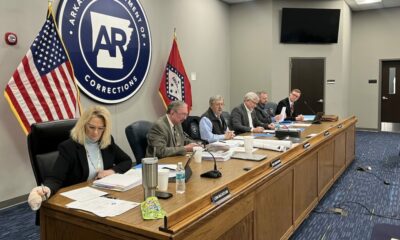Mississippi Today
Trying to make sense of NIL and the transfer portal, like it or not

It is the question I get asked most no matter where I go: at a civic club, the barber shop, a tavern, the golf course, the grocery store or just about anywhere else.
Goes like this: So, how do you really feel about name, image and likeness (NIL) and the transfer portal?

Here’s the truth: I hate the combination of the two. I despise what the two, together, have done to college sports, which is rip away the foundation of what the college sports experience was supposed to be about, both for participants and for spectators. Simply put, for me, it is not as much fun as it once was.
I hasten to add, that is not because some athletes are making hundreds of thousands of dollars or that some are becoming rich before they even know what to do with the riches. Ever since college sports became a TV-fueled multi-billion dollar industry, I have believed the athletes should share in the spoils.
Just not this way, with the right to play musical schools on an annual basis depending on who offers the most money. It’s free agency without guidelines and without a salary cap – and really, without any regard for education. The richest schools will get the best players, and the poor will get the hell beat out of them.
I was talking the other day with a wealthy fan of one of our Mississippi universities. He has done really well financially and has always supported his school’s teams and facilities, donating significantly. But he has drawn a line where the NIL is concerned. This is what he told me: “I am not about to donate tens of thousands of dollars to a collective so our star running back can go out and buy himself a Porsche and then drive it off next year to Tuscaloosa or Baton Rouge for a better deal.”
But it’s happening everywhere. In 2019, 6.5% of all Division I football players had transferred at least once. This past season, more than 20% had. More than 2,100 Division I players have entered the portal this year. That figure will continue to rise. To say it doesn’t always work out for those who enter the portal is an understatement. In 2022, of all the college basketball players who entered the portal, nearly 20% wound up without a college scholarship anywhere.
Sports participation teaches many life lessons, one of which is that perseverance and hard work in the face of disappointment will pay off in the end. The portal teaches the opposite. Used to be that if you were a second teamer and weren’t getting on the field or court as much as you desired, you buckled down and worked harder. Now? “Screw this,” they tell the coach, “I’m going in the portal.”
College coaching has changed forever. Tough love is out. Coaching on eggshells is in.
“There’s no holding players accountable,” a retired college basketball coach told me. “Used to, you could use the bench as a motivator. Now, they’ll just leave.”
Here, the biggest news in this football portal season has been Ole Miss running star Quinshon Judkins moving from on to Ohio State after two seasons in Oxford.
Regular readers of this column know how I feel about Judkins’ football abilities and performance. His blend of vision, power, balance, quickness, toughness and speed remind me of my favorite football player ever, Walter Payton. The great linebacker D.D. Lewis once told me Payton was the most difficult to tackle he ever faced. “It hurt to tackle Payton,” D.D. said. “It was like trying to tackle a 215-pound bowling ball.”
Judkins runs like that. When he gets tackled, it hurts the other guy worse than him.
Now, he’s a Buckeye after providing 34 touchdowns and more than 3,000 yards from scrimmage in two seasons at Ole Miss. All indications are that Judkins shopped his availability around the country and that, in the end, he will make less money at Ohio State than he was making at Ole Miss.
Then there’s the case of Will Rogers, the ex-Brandon and Mississippi State quarterback, who had planned to transfer to Washington, this past season’s No. 2 team in the country. But Kalen DeBoer, the Washington coach, has taken the Alabama job and Rogers is back in the transfer portal.
Fans have had to adjust, too. In 2020, Malik Heath caught the only two Mississippi State touchdowns in a 31-14 loss to Ole Miss. A year later, Heath made just one catch in another Egg Bowl loss to Ole Miss. In 2022, Heath entered the portal and switched sides. He played for Ole Miss, making five catches for 80 yards in the Egg Bowl. State got the last laugh, winning 24-22. Heath, 0-3 in Egg Bowls, now plays for the Green Bay Packers.
Such a switch of allegiances would have been unthinkable in the old days. Not now.
It will take some time to adjust. Not sure I ever will.
This article first appeared on Mississippi Today and is republished here under a Creative Commons license.
Mississippi Today
Government secrecy tends to bite Mississippi in the butt. It’s happened again
The state Senate Republican leadership didn’t plan to fail on a Mississippi tax overhaul. It failed to plan.
And when pressed late in the 2025 legislative session to come up with a proposal to counter the House Republican leadership’s sweeping bill, Senate leaders did so behind closed doors and hurriedly.
The result: a majority of legislators passing a tax overhaul bill full of math errors that accidentally did what Senate leaders didn’t want. And it stripped out safeguards for taxpayers that both the House and Senate leadership said were prudent.
No matter how much Gov. Tate Reeves praises House Bill 1 as “one big, beautiful bill,” borrowing a phrase from President Trump as he signed it into law, it was passed through secrecy, subterfuge and error, not representative democracy.
Had the Senate perhaps taken a little more time, allowed more input from and access to its strategizing from rank-and-file lawmakers, and who knows, maybe even a little crowd-sourcing allowing the public to scrutinize the bill before passing it, maybe the blunder could have been prevented.
READ MORE: OOPS! Senate sent House an income tax bill with typos. House ran with it. What’s next?
And while House leaders should receive praise for coming up with an initial public-facing tax overhaul plan through months of public hearings and forums, that’s not what was passed into law. House leaders played a game of secret squirrel to pass the Senate’s mistakes into law. Then instead of negotiating in good faith to fix the problems, House leaders tried to shanghai the Senate in backroom negotiations to pass a few plums they wanted, such as legalized online sports betting and a sales tax increase.
The end result: Historically bitter infighting among state GOP leaders to the point they couldn’t even pass a state budget, their main job. And we have communications between Mississippi’s top legislative leaders and governor, all Republicans, that these days are often reduced to mean tweets or Facebook posts about each other, not earnest negotiations.
READ MORE: The Typo Tax Swap Act of 2025 may be the most Mississippi thing ever
Mississippi government’s default setting is secrecy, from public records and meetings to access to elected officials, and it has never served our citizens well. From a black-ops agency that spied on its citizens for nearly two decades to festering, generational government corruption that has cost taxpayers hundreds of millions of dollars, secrecy is neither good politics nor good policy.
Major, sweeping state policy should be conducted in the open and with public input. But as the national and world economies plunge into turmoil that is sure to impact Mississippi, our new tax code lacks safeguards that both House and Senate leaders said were needed — all because of secrecy and lack of planning and communication.
This article first appeared on Mississippi Today and is republished here under a Creative Commons Attribution-NoDerivatives 4.0 International License.
Mississippi Today
Ward 6 council candidates face the image of south Jackson versus the reality
Driving down roads in south Jackson in recent weeks, residents were inundated with placards of smiling faces and names in bright, bold fonts of people hoping to be the next Ward 6 councilman.
In some neighborhoods, the streets were as littered with campaign signs as they are overgrown lots and abandoned properties in between neatly kept homes.
“The homes in the surrounding area and businesses in Ward 6 have been decimated. It looks like a bomb went off,” said Sylvia Walker, Ward 6 board member for the Jackson Association of Neighborhoods. “We’ve seen the businesses hollow out and nothing come back in. It’s disheartening. It’s sad.”
Walker said the image of south Jackson must be interrogated. Not enough people are talking about the good happening in Ward 6, she said.
“South Jackson is very diverse and not just one specific area,” said Walker. “I think the biggest misconception is that south Jackson is just full of dilapidated homes, and the people are poverty-stricken and destitute, and that’s not true.”
Ward 6 has the largest population of Jacksonians, with just over 23,000 people. It also has the highest number of Black residents, according to data from the City of Jackson’s website.
Jackson also has a high number of abandoned properties owned by the state. According to data from the Secretary of State’s office, there are about 1,900 tax-forfeited properties in the City of Jackson.
There will be a Democratic runoff on April 22 between two candidates for the Ward 6 city council seat. Emon Thompson Sr. garnered 714 votes and Lashia Brown-Thomas came in second with 652 votes. Voter turnout was low, with less than 3,200 votes cast in a ward with a voting age population of more than 16,000. There were nine contenders for the coveted council seat, more than any other council race.
Candidates for the coveted Ward 6 seat envision a more beautiful, thriving south Jackson. After a stacked primary, two candidates have made it to the runoff to replace Aaron Banks, former council person who faces criminal charges for allegedly accepting cash bribes in exchange for his vote on a development project. He pleaded not guilty.
Banks is familiar with the image problem in south Jackson. He said he’s made progress with more demolitions and landscaping work done than others in the past. This includes the demolition of Casa Grande Apartments and Appleridge Shopping Center.
“I’ve always said that I would serve two terms, and we got a lot of work done,” Banks said in a recent interview with Mississippi Today.
Brown-Thomas said that crime and blight are the biggest issues affecting Ward 6. The law enforcement officer wants to hold people accountable for their part in the perceived image of a decaying south Jackson.
“The city has codes, and if these people are not holding up to the codes, they need whatever punishment there is,” Brown-Thomas said. “If they aren’t holding the property up, then they should not have the property.”
She said that if she’s elected, she’ll work to get police officers higher wages, and will remain transparent and available to constituents.
“It’s not going to happen overnight, but it will take some time,” Brown-Thomas said. “I’m not saying it’s going to come in a year, not even two years, but we have to address the issues first, then everything else will fall in line.”

Thompson Sr., a business owner and retired veteran, said that a lot of the issues with blight comes down to enforcement.
“We need to, first of all, clean up our blighted properties by using the laws that we already have,” Thompson said. “The city already has ordinances with enough teeth to deal with blight.”
South Jackson voters don’t turn out like they should, he said, which can lead to a distrust in the system. He hopes, if elected, to be able to reach constituents where they are and keep them a part of the process in restoring their communities, like water improvement or curbing crime.
“Out of the 40 something thousand people that’s in south Jackson, maybe 3,900 people vote in the municipal elections,” he said. “They don’t have faith in the government anymore.”
“…If there’s a reason why we’re not getting any services out here, then I want to make sure I communicate that with a constituent so they can continue to have hope,” he said.
Representative Ronnie Crudup, Jr., D-Jackson, said that residents’ migration out of Jackson creates bigger issues for communities.
“To me, blight is just a symptom of a larger problem. The people are leaving the city of Jackson, and the population is decreasing,” Crudup said. “When people leave the properties, you end up with squatters and vagrants who move into these properties and tear them up.”
Crudup has been renovating and demolishing blighted properties in south and west Jackson for nearly eight years. So far, he said he’s renovated about 35 homes.
“Even though we are demoing and tearing down one or two properties, when people leave, that leaves other ones there,” he said. “You got all these blighted properties all around south and west Jackson, and some even in parts of north Jackson now, because people are leaving.”
He said the one thing that’s needed most: more funding from all levels of government for blight mitigation work.
“There needs to be more money from the legislature, but there needs to be more money allocated from the city council too,” Crudup said. “I think the city is going to have to take clean up efforts to a higher circumstance, and let the legislature see that they’re serious about this, and also get the county involved and let them know ‘Hey, we need all the help we can get.’”
And, the perception that city leaders have abandoned south Jackson is not necessarily right. Former Jackson Mayor Harvey Johnson said that blight is an issue that affects not only south Jackson but all parts of the city. Mitigating blight is going to take an intergovernmental approach, he said.
“I know that in some cases, some people feel they’ve been sort of abandoned, but I don’t think that’s the case,” Johnson said. “It may be a lack of resources to attack the problem and it’s going to require all governments to work together.”
Walker said she remembers when the city’s southern boundary changed and her neighborhood, which had been part of Byram, came inside Jackson city limits. A small portion of her ward was annexed by the city of Jackson in 2006 as part of Byram’s reincorporation. In the last couple of decades, she said she’s seen people be forced out of their homes due to the recession. Others simply chose to leave.
“We’ve had a turnover, but the neighborhood is still relatively stable,” Walker said. “When we moved in, a lot of people moved out.”
Walker said that while her neighborhood isn’t struck by blight, she sees abandoned properties while making her way through the community and near her church.
When thinking of a candidate that she would want to vote for, Walker said she’s looking for a good communicator who can be an advocate for the ward.
“We need someone that’s forward thinking. Someone that has the best interests of the residents of south Jackson and an understanding of the vast diversity of the ward,” she said. “Someone that’s able to work with other members of the City Council. Someone able to work with our board of supervisors and state legislators to find solutions to some of these issues.”
Banks said that his greatest achievement as city councilman was hosting quarterly town hall meetings to inform his constituents on the importance of ordinances and legislation created to better their lives.
“There’s one piece of legislation that deals with overhanging tree limbs and limbs. That idea came from a constituent,” he said. “When you see constituents being able to give informed ideas on legislation, which is the job of a council member, I think that’s an achievement because then what that says is there’s involvement in the process.”
“I hope the next person will understand that communicating with the people is key, and that the people of Ward 6 are resilient,” Banks said. “As long as they continue to communicate and stay in the scope of their job and work with the administration, there’s a lot that can be done.”
This article first appeared on Mississippi Today and is republished here under a Creative Commons Attribution-NoDerivatives 4.0 International License.![]()
Mississippi Today
On this day in 1962, white cop killed Cpl. Roman Ducksworth
April 9, 1962

Cpl. Roman Ducksworth Jr., a 27-year-old Black military police officer stationed at Fort Ritchie, Maryland, was traveling home by bus to Mississippi. His wife, Melva, was expecting their sixth child and was now in the hospital because of complications.
By the time he arrived home in Taylorsville, Mississippi, he had fallen asleep. The driver called William Kelly, a white police officer onto the bus to wake him. Kelly instead arrested the serviceman, claiming he was drunk.
Off the bus, the two struggled, and the officer shot twice, striking Ducksworth in the chest. He died without knowing his wife had just given birth to a healthy baby girl. Kelly claimed he shot Ducksworth in self-defense, and he was never prosecuted.
Later he sent a message to Ducksworth’s father: “If I’d known it was your son I wouldn’t have shot him.” The father replied, “I don’t care whose son it was, you had no business shooting him.”
More than 2,000 attended the funeral for Ducksworth, who was buried with full military honors, including a 16-gun salute by an integrated honor guard. He is among 40 martyrs listed on the Civil Rights Memorial in Montgomery, Alabama.
This article first appeared on Mississippi Today and is republished here under a Creative Commons Attribution-NoDerivatives 4.0 International License.![]()
-

 News from the South - South Carolina News Feed6 days ago
News from the South - South Carolina News Feed6 days agoSouth Carolina clinic loses funding due to federal changes to DEI mandates
-

 The Center Square6 days ago
The Center Square6 days agoCA fails audit of federal programs, 66% of COVID unemployment benefits in question | California
-

 News from the South - Arkansas News Feed6 days ago
News from the South - Arkansas News Feed6 days agoArkansas prison board approves contractor search for Franklin County prison
-

 News from the South - Alabama News Feed6 days ago
News from the South - Alabama News Feed6 days agoAlabama House passes public school cell phone ban
-

 News from the South - Georgia News Feed7 days ago
News from the South - Georgia News Feed7 days agoBond hearing for man accused of murdering pregnant ex | FOX 5 News
-

 News from the South - Alabama News Feed4 days ago
News from the South - Alabama News Feed4 days ago‘Hands Off!’ Protest Held in Huntsville Saturday | April 5, 2025 | News 19 @ 9 P.M.
-

 News from the South - Kentucky News Feed7 days ago
News from the South - Kentucky News Feed7 days agoTornado likely behind heavy damage in rural Taylor County, officials say
-

 News from the South - Oklahoma News Feed6 days ago
News from the South - Oklahoma News Feed6 days agoRetired Cops Sound Alarm on Pension Board Shift













































